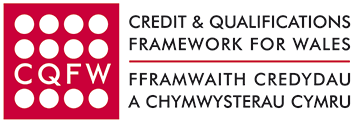Contribute to the Support of Child and Young Person Development
- ID Uned:
- CCY384
- Cod Uned:
- PT22CY070
- Lefel:
- Dau
- Credydau:
- 3
- Sector:
- 1.3
- LDCS:
- PT21
- Oriau dysgu dan arweiniad (GLH):
- Dyddiad cofrestru diwethaf:
- 31/08/2019
- Cyfyngiad oedran isaf:
- 16

Pwrpas a Nod
The aim of this unit is for the learner to apply their knowledge and understanding in order to support child and young person development. The unit also includes support to children and young people experiencing transitions and positive behaviour support
CANLYNIADAU DYSGUBydd y myfyriwr yn
|
MEINI PRAWF ASESUMae’r myfyriwr yn gallu
|
||||||||||||
|---|---|---|---|---|---|---|---|---|---|---|---|---|---|
|
|
||||||||||||
|
|
||||||||||||
|
|
||||||||||||
|
|
||||||||||||
|
|
Dulliau Asesu:
Gwybodaeth Asesu:
Nid oes unrhyw wybodaeth asesu penodol sydd i'w defnyddio gyda'r uned hon.
Os nad yw wedi’i nodi’n benodol yn y wybodaeth asesu, mae datganiad lluosog mewn unrhyw faen prawf asesu yn golygu o leiaf dau.
Mapiadau Eraill:
NOS ref: CCLD 203
Gofynion Aseswyr:
This unit must be assessed in accordance with Skills for Care and Development QCF Assessment Principles.
LO 1, 2 & 4 assessed in real work environment.
Additional information:
Please note that for assessment of practice the term ‘children’ or ‘young people’ can be interpreted as one child or young person or more than one.
Observe and record aspects of development eg:
• Physical
• Communication
• cognitive
• Social, emotional and behavioural
Different observation methods e.g.
• Running records
• Diary
• Anecdotal
• Time sampling
• Event recording
• Checklist
• Narrative
• Group, solo and 1-2-1 interaction
• Observation with or without adults
Support assessments e.g.
• Take into account the work setting’s Assessment Framework/s
• Confidentiality
• Avoiding bias
• Children’s wishes, views and feelings
• Information from parent, carers, children and young people, other professionals and colleagues
Ways the identified development needs of a child or young person can be met in the work setting.
• Meet individual needs ( personalised)
• Reflect children’s’ interests and views
• Through play for children in early years
• Provide challenge
• Flexible plans
Different types of transitions e.g:
• Emotional, affected by personal experience e.g. bereavement, entering/ leaving care
• Physical e.g. moving to a new educational establishment, a new home/locality, from one activity to another
• Physiological e.g. puberty, long term medical conditions
• Intellectual e.g. moving from pre school to primary to post primary
• Smaller daily transitions
• Between carers
How the work setting encourages children and young people’s positive behaviour eg:
• Developing positive relationships
• Listening to children and valuing their opinions
• Providing a stimulating and challenging environment
• Well planned experiences
• Giving children choices
• Meet individual needs
• Inclusive practice
• Adult role model
• Clear boundaries
• Positive behaviour reinforced (praise/rewards)
• Encouraging children to resolve conflict
• Looking for reasons for inappropriate behaviour (through observations)
• Following behaviour policy
• Following plans for individual behaviour